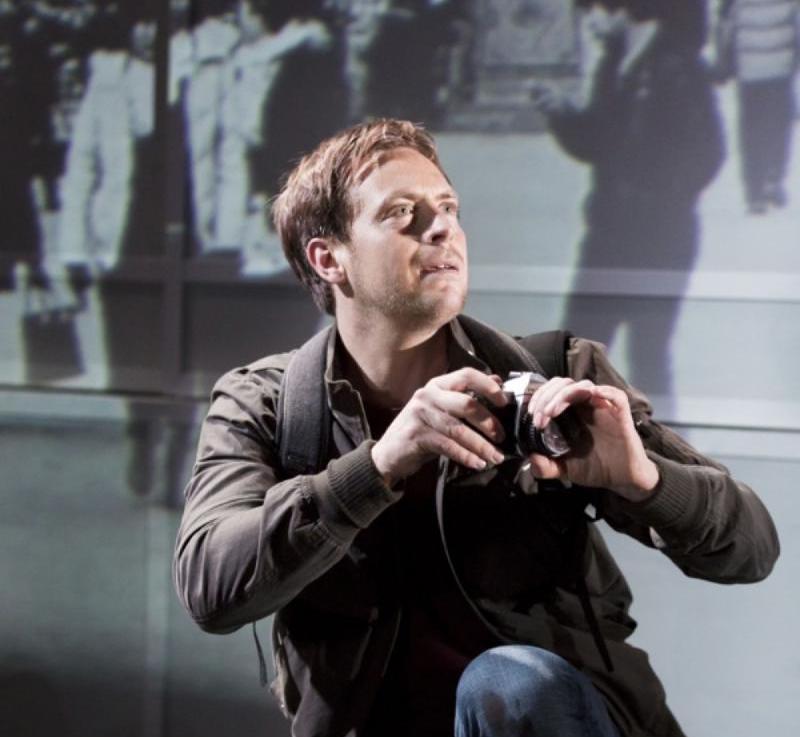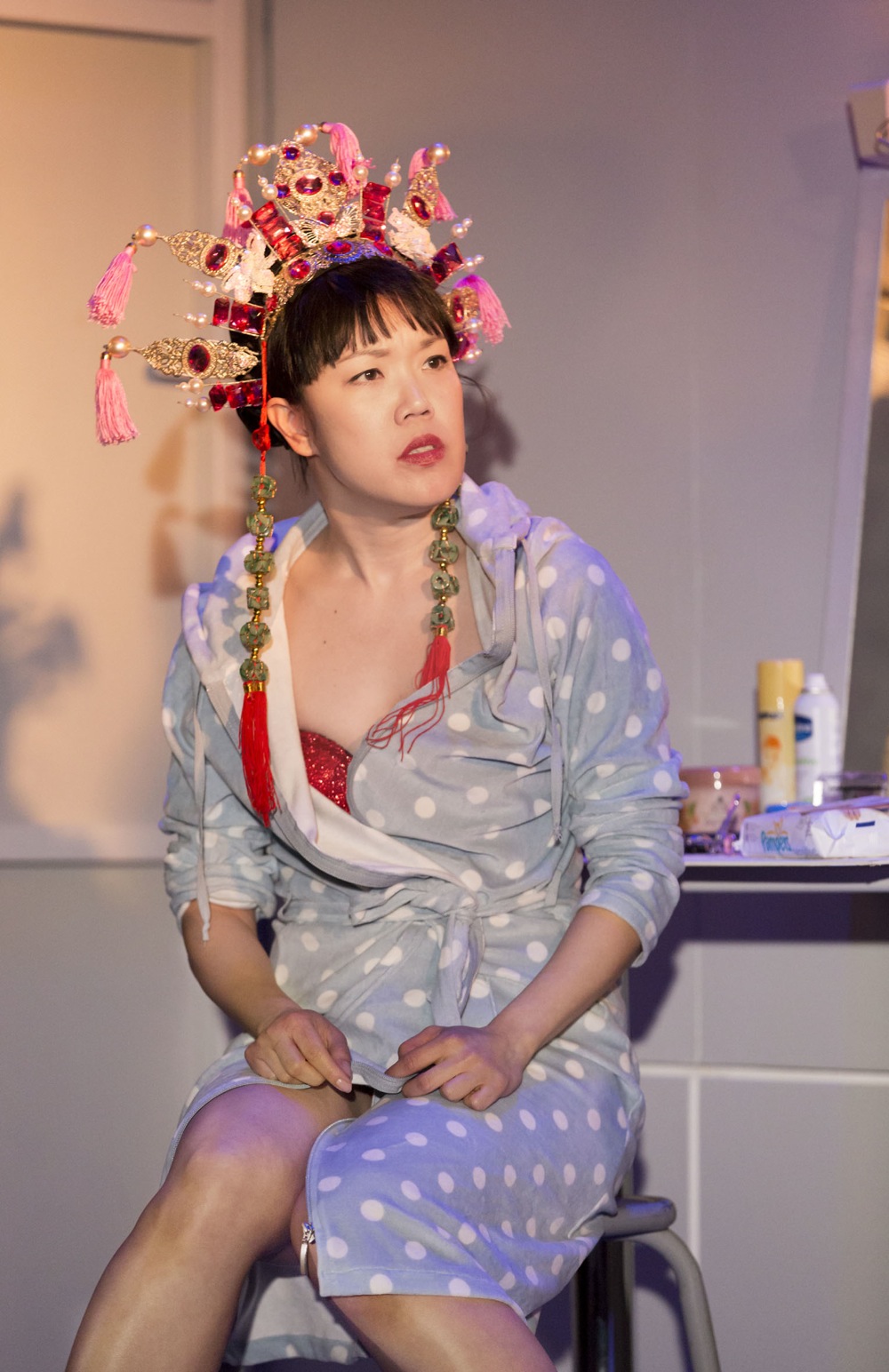Chimerica, Harold Pinter Theatre | reviews, news & interviews
Chimerica, Harold Pinter Theatre
Chimerica, Harold Pinter Theatre
Lucy Kirkwood's new thriller about culture and economics in the East and West dazzles

It’s as dazzling as a neon-lit cityscape and nearly as sprawling: Lucy Kirkwood’s epic new drama is rich, riveting and theatrically audacious. A co-production with Headlong, the tirelessly inventive touring company founded by Rupert Goold, it feels like an early statement of intent for Goold’s upcoming tenure as artistic director of the Almeida, which begins this September. Fizzing with wit and intelligent ideas, it’s handled with impeccable flair by director Lyndsey Turner.
The play’s title is drawn from Niall Ferguson’s book The Ascent of Money, in which he considers globalisation and the uneasy relationship between behemoths China and the US. Kirkwood gives economic and cultural issues a human face – albeit one that shifts in and out of focus throughout the dragon’s-tail plot twists of her riveting theatrical thriller. The non-stop action begins with an image: that of the famous 'Tank Man', the lone, slight figure clutching two plastic shopping bags, who stood defiantly in the path of the tanks during the Tiananmen Square protest of 1989. Joe Schofield (Stephen Campbell Moore) is an American photojournalist who snaps a picture of that historic moment. Twenty-three years later, with trade relations with China a major issue in the American election campaign, Joe pitches the idea of a story investigating what became of this nameless hero to his hard-boiled newspaper editor (Trevor Cooper), and flies to Beijing in search of leads. En route he encounters Claudie Blakley’s Tessa, a British market researcher commissioned by a US credit-card company to find out what makes modern Chinese consumers tick.
 Joe’s source is Zhang Lin (Benedict Wong), an English teacher who was in Tiananmen Square that day and has a name to pass on. The trail leads Joe back to New York; and while he and his sandpaper-tongued writer-colleague Mel (Sean Gilder) scour the streets, stores and strip joints of Chinatown and beyond in search of Tank Man, Zhang’s life grows increasingly terrifying. Through the paper-thin walls of his apartment he can hear the wracking cough of his middle-aged neighbour, once a propaganda poster girl for the Party, now a victim of 'Beijing Lung' – respiratory disease caused by smog. The authorities are suspicious of his involvement with Joe; and Zhang is haunted by the memory of his dead wife (Elizabeth Chan), a pale, wraith-like figure who materialises without warning, gliding through walls like a unquiet spirit from a Far Eastern ghost story.
Joe’s source is Zhang Lin (Benedict Wong), an English teacher who was in Tiananmen Square that day and has a name to pass on. The trail leads Joe back to New York; and while he and his sandpaper-tongued writer-colleague Mel (Sean Gilder) scour the streets, stores and strip joints of Chinatown and beyond in search of Tank Man, Zhang’s life grows increasingly terrifying. Through the paper-thin walls of his apartment he can hear the wracking cough of his middle-aged neighbour, once a propaganda poster girl for the Party, now a victim of 'Beijing Lung' – respiratory disease caused by smog. The authorities are suspicious of his involvement with Joe; and Zhang is haunted by the memory of his dead wife (Elizabeth Chan), a pale, wraith-like figure who materialises without warning, gliding through walls like a unquiet spirit from a Far Eastern ghost story.
The themes under consideration are thrillingly myriad. As well as the big socio-economic questions, Kirkwood’s shutter clicks away on ideas of personal and political responsibility and the power of the image, particularly in the internet age, when cyberspace – subject to repressive state control in China – is beset by trolling and self-important white noise, when every story or picture can easily be manipulated and newspapers are in decline. As Joe’s editor points out, no piece of journalism can run without space below for comments by “Assholes Anonymous” – “because God forbid an opinion should go unvoiced”. Joe’s photograph of Tank Man itself is ripe for exploitation, finding its way into Tessa’s client pitch – “Look,” she says, pointing out the figure’s dangling plastic carriers, “he’s been shopping.”
Es Devlin’s design conveys both the multiple locations and the layered complexity of the piece with slick skill. The set, a little like an oversized camera, is a giant rotating cube with sliding apertures; on to its sides are projected video images, by Finn Ross, that conjure scenes from both Beijing and the Big Apple with filmic detail and elegance, along with scores of reportage-style pictures on contact sheets – the kind of photographs from which the world creates its narratives and its history. This is theatre as epic in scope and visually impressive as the work of Robert Lepage – and if it’s also as occasionally diffuse, it makes up for it with smart-talking, film-noirish style. Kirkwood, for some years a dramatist of perspicuity, has here created a work of real brilliance. Scintillating.
- Chimerica at the Harold Pinter Theatre until 19 October
Add comment
The future of Arts Journalism
You can stop theartsdesk.com closing!
We urgently need financing to survive. Our fundraising drive has thus far raised £49,000 but we need to reach £100,000 or we will be forced to close. Please contribute here: https://gofund.me/c3f6033d
And if you can forward this information to anyone who might assist, we’d be grateful.

Subscribe to theartsdesk.com
Thank you for continuing to read our work on theartsdesk.com. For unlimited access to every article in its entirety, including our archive of more than 15,000 pieces, we're asking for £5 per month or £40 per year. We feel it's a very good deal, and hope you do too.
To take a subscription now simply click here.
And if you're looking for that extra gift for a friend or family member, why not treat them to a theartsdesk.com gift subscription?
more Theatre
 The Estate, National Theatre review - hugely entertaining, but also unconvincing
Comedy debut stars Adeel Akhtar, but is an awkward mix of the personal and the political
The Estate, National Theatre review - hugely entertaining, but also unconvincing
Comedy debut stars Adeel Akhtar, but is an awkward mix of the personal and the political
 That Bastard, Puccini!, Park Theatre review - inventive comic staging of the battle of the Bohèmes
James Inverne enjoyably reconstructs the rivalry between Puccini and Leoncavallo
That Bastard, Puccini!, Park Theatre review - inventive comic staging of the battle of the Bohèmes
James Inverne enjoyably reconstructs the rivalry between Puccini and Leoncavallo
 Till the Stars Come Down, Theatre Royal Haymarket review - a family hilariously and tragically at war
Beth Steel makes a stirring West End debut with her poignant play for today
Till the Stars Come Down, Theatre Royal Haymarket review - a family hilariously and tragically at war
Beth Steel makes a stirring West End debut with her poignant play for today
 Nye, National Theatre review - Michael Sheen's full-blooded Bevan returns to the Olivier
Revisiting Tim Price's dream-set account of the founder of the health service
Nye, National Theatre review - Michael Sheen's full-blooded Bevan returns to the Olivier
Revisiting Tim Price's dream-set account of the founder of the health service
 Girl From The North Country, Old Vic review - Dylan's songs fail to lift the mood
Fragmented, cliched story rescued by tremendous acting, singing and music
Girl From The North Country, Old Vic review - Dylan's songs fail to lift the mood
Fragmented, cliched story rescued by tremendous acting, singing and music
 The Merry Wives of Windsor, Shakespeare's Globe review - hedonistic fizz for a summer's evening
Emma Pallant and Katherine Pearce are formidable opponents to Falstaff's buffoonery
The Merry Wives of Windsor, Shakespeare's Globe review - hedonistic fizz for a summer's evening
Emma Pallant and Katherine Pearce are formidable opponents to Falstaff's buffoonery
 Run Sister Run, Arcola Theatre review - emphatic emotions, overwrought production
Chloë Moss’s latest play about the different lives of two sisters is deeply felt
Run Sister Run, Arcola Theatre review - emphatic emotions, overwrought production
Chloë Moss’s latest play about the different lives of two sisters is deeply felt
 Intimate Apparel, Donmar Warehouse review - stirring story of Black survival in 1905 New York
An early Lynn Nottage work gets a superb cast and production
Intimate Apparel, Donmar Warehouse review - stirring story of Black survival in 1905 New York
An early Lynn Nottage work gets a superb cast and production
 Hercules, Theatre Royal Drury Lane review - new Disney stage musical is no 'Lion King'
Big West End crowdpleaser lacks punch and poignancy with join-the-dots plotting and cookie-cutter characters
Hercules, Theatre Royal Drury Lane review - new Disney stage musical is no 'Lion King'
Big West End crowdpleaser lacks punch and poignancy with join-the-dots plotting and cookie-cutter characters
 Showmanism, Hampstead Theatre review - lip-synced investigation of words, theatricality and performance
Technically accomplished production with Dickie Beau never settles into a coherent whole
Showmanism, Hampstead Theatre review - lip-synced investigation of words, theatricality and performance
Technically accomplished production with Dickie Beau never settles into a coherent whole

Comments
I liked the play, but it was
This must surely be the most